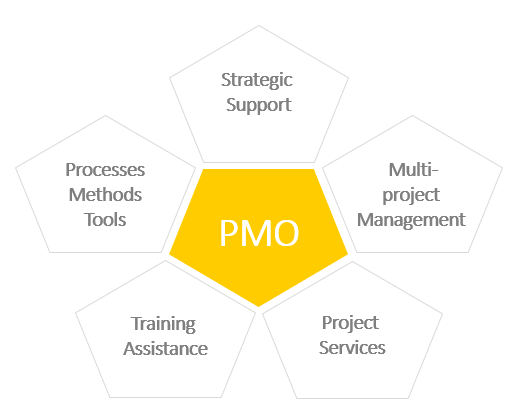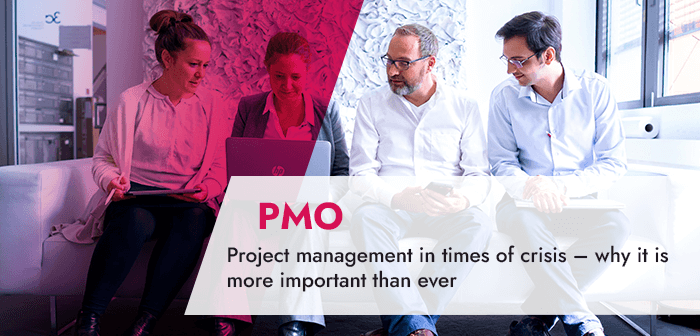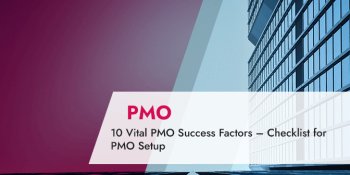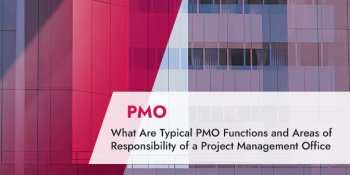How strongly has the Covid-19 pandemic crisis affected me? What will happen now, and what can we expect for the future? These questions are on everyone’s mind right now, whether they’re an individual, freelancer, or company. The virus has severely restricted our personal and professional lives for many weeks now, affecting some more than others. How is project management being handled during this crisis, and what effect will this have going forward? Will it become more important or less so?
This article will explore this question. You can learn more in these chapters:
- Evolution of project management in times of crisis
- Project management – why is it even more important during a crisis?
- Project managers & PMO – two key players in project management during a crisis
- Working from home – a new experience for many people
- Conclusion: Project management during a crisis
We’ll start by taking a look at how project management has evolved over the past few years.
Let’s go!
Comic for May 02, 2020 #dilbert https://t.co/0zJLc63kdz pic.twitter.com/8s2xLKpptr
— Dilbert (@dilbertstrip) May 2, 2020
Evolution of project management in times of crisis
In the boom times of the past 12 years and the increasing globalization, multi-project management grew in importance. Numerous companies became aware of the benefits provided by project management and implemented the associated methods, processes, and tools.
In recent times, the growth in project management was driven by the sheer volume of orders and projects needing to be handled concurrently. Many companies established PMOs to handle the coordination. They defined standards, and trained and supported project managers, and optimized the way they handled multiple projects and used resources.
The upturn filled the order books in nearly every sector of the economy, and many companies had the enviable problem of having to scramble to keep up with the continual growth in demand for their products. The era saw employees hired, entities reorganized, production facilities built, partnerships established, companies bought, and a global expansion into new markets.

Special Download: How to setup a PMO in 4 simple steps (PDF file)
Please fill in the form.
* Required Fields | Data Protection
Companies scoured the nation for employees in a wide range of professions and struggled to find suitable candidates. This scarcity and the associated labor costs became a real problem in almost every sector. In response, many activities were offshored to countries were suitable employees were available at an acceptable cost.
This had a strong effect on how project management was handled.
- The focus thereby shifted from managing individual projects to the multi-project management increasingly common today.
- More and more companies now have a centralized Project Management Office (PMO) to provide project management support to remedy the lack of uniform standards and processes.
- PMO responsibilities increasingly extend up the hierarchy to the level of corporate management, for example in the selection of projects and portfolio management.
- The shortage of qualified personnel makes it more difficult to find suitable candidates to handle demanding and innovative project-related duties. Good resource management has therefore become a critical factor and is often the primary reason why project management is introduced.
- The increasingly competitive environment is forcing companies to complete projects even faster, which is driving the demand for project management and suitable tools.
- Agile methods are now increasingly used to foster closer collaboration with clients in order to derive a greater value from the project’s results.
- Because these projects involve several companies working together, the interdependencies are more complex and there’s an even greater international focus.
The project environment has also undergone significant changes. Everything focused on growth and internationalization.
So, the question is: how can project management help us through a crisis?
Upcoming TPG webinars are listed here > Project Management Webinars
Project management – why is it even more important during a crisis?
Most crises are often, at their core, also a resource problem. However, let’s look at it from another angle: it’s a problem of too many workers pursuing scarce work. To remedy this, you either need to bring in more projects or reduce the number of employees.
For this reason, as we see today, good project management is especially vital during a crisis.
Your company probably has some essential projects that need to continue despite the economic downturn. The important questions to ask yourself are:
- Which projects should I omit or modify in scope?
- What staffing do I need to accomplish this?
- Which projects can I postpone or cancel?
- Which people and what skill sets are essential, and which can I let go of?
- And now, in the Covid-19 era: which activities can be done from home and which can’t?
Comic for April 25, 2020 #dilbert https://t.co/B79U8X4UAG pic.twitter.com/b2WqUXdldU
— Dilbert (@dilbertstrip) April 25, 2020
Without good, centralized PMO-managed project management, you lack the foundation for good decision-making. This magnifies the following problems:
- No established process for managing multiple projects
- An incomplete list of projects
- Lack of prioritization in the project list
- Hidden interdependencies between the projects
- Unclear goals for the individual projects
- Unrealistic plans regarding project effort
- Missing calculations of the project’s true costs
- Incomplete overview of the resource utilization
- Missing overview of the resource skill sets
- Lack of criteria for project termination
- Absence of a failure-tolerant corporate culture
Good project management is extremely important during a crisis because it strongly contributes to the company’s success – in good times and bad.
A good PMO promotes transparency in the project environment and provides a good foundation for decision-making, regardless of whether there are currently too many projects or too few.
In boom times, bad project management might not be immediately noticeable, but during a crisis it can lead to the company’s demise.
In the midst of a crisis, the last thing you want to do is cut PMO funding! The best strategy is to strive to improve your project management so that it contributes even more to your company’s success.
The best way to do this is by optimizing your PMO. A robust PMO’s true worth is most evident during a crisis. It can:
- Provide the information desperately needed for making informed decisions through the use of established processes and methods
- In some cases, even provide careful self-critical decisions
- Serve as a contact point to support the project managers in difficult times
Project managers & PMO – two key players in project management during a crisis
Project manager responsibilities have also changed over time.
Gone are the days when a project manager was judged solely on whether a project was delivered on time and within budget. They are now also bear responsibility for ensuring that the project’s intended benefit is realized. And this is especially important during times of crisis.
Project management, as a whole, is becoming ever more collaborative. Simply managing a project is no longer enough, it’s important to provide the teams with efficient leadership as well. Agile methods, in particular, involve even closer cooperation with project teams.
However, communication also plays an important role in traditional project management as a result of the increasing complexity of the project scope and the numerous disciplines involved.
Special Download: Agile, Traditional or Hybrid Project Management? (PDF file)
Please fill in the form.
* Required Fields | Data Protection
The better the communication and collaboration, the more successful the projects generally are.
Within the project, the project manager is responsible for ensuring good communication. The PMO is responsible for ensuring this among the various projects.
The PMO must optimize resource utilization and handle the coordination between the project managers and team leaders. For increasingly more companies, the PMO is also responsible for implementing the strategic goals of executive management.
These goals must be communicated frequently and thoroughly to ensure that people understand the priorities and how the benefits are evaluated. Project results are always more achievable if everyone involved understands not only what is expected of them but also why or why not.
Our tip: Especially during a recession, avoid forcing a project to be completed at any price just so that you can mark it as done. Instead, ask yourself if the project is really necessary. Don’t waste resources on projects that don’t add any value.
Make sure you have a well-established project portfolio management system in place and use this to support the cultural evolution taking place. Have the courage to promptly halt any hopeless projects and those without any real benefit. Doing so can help rescue your company.
#geekandpoke pic.twitter.com/IMpKUAwvOI
— Anna Pauels (@AnnaPauels) May 7, 2020
The recession emerging now, combined with resource problems, means that companies – yours included – should adhere to the following important principle: Concentrate your financial resources and staff on projects that will earn you money, to help recover faster from this crisis.
Working from home – a new experience for many people
Companies around the globe are allowing their employees to work from home if possible. For many, this is a completely new experience.
Comic for April 23, 2020 #dilbert https://t.co/OxbwGbmLyg pic.twitter.com/JrbD0wdXgB
— Dilbert (@dilbertstrip) April 23, 2020
Handling a full day’s work from outside the office, sometimes at home with kids, has proven to be a major challenge.
Project managers are now required to manage the project and make progress while working remotely.
This is inconceivable without the appropriate workplace technology. It enables you to handle meetings and give presentations while working from home. However, this situation presents other challenges such as finding the best way to foster collaboration – both within the project team and throughout the company.
Communication tools such as Microsoft Teams provide the technical means for staying in contact. The same demands that apply to in-person communication also apply to online communication – but are magnified.
Project managers need to instruct a variety of people in how to:
- Handle the project work
- Estimate the effort and resources needed
- Provide feedback
- Deliver progress reports
- Alert those responsible to any risks
Now more than ever, it’s essential that project managers reach out to the team members more frequently.
People working from home no longer meet colleagues during their commute, at lunch, at the coffee machine, or simply in the hallway, so these opportunities to casually share information are gone.
Comic for April 24, 2020 #dilbert https://t.co/XyLgCFZVAI pic.twitter.com/UTtB6pK9ND
— Dilbert (@dilbertstrip) April 24, 2020
You need to find a way to eliminate any hesitation employees may have in using tools such as Microsoft Teams. Employees should feel as comfortable contacting someone online as they would by walking into the other person’s office at work.
Be sensitive to people’s hesitation to use these tools and take steps to help them overcome this.
Actively discuss this and set up agreed-upon core hours when people will be accessible. Emphasize that working from home doesn’t mean that everyone is accessible 24×7.
Suggest that everyone on the video call turn on their camera, at least in the beginning when everyone is greeted. As the meeting organizer, set a good example by turning yours on. Don’t worry, it’s easy. Seeing themselves on the screen will be a strange feeling for many people, but it’s easier to talk to someone if you can see them. Being able to see the meeting participants will make it feel more human and encourage good communication.
We recommend that you hold shorter, more frequent online meetings. As project manager, you need to be kept up to date on everything, even if you now see these people less often in person.
Also, most people prefer short, frequent meetings over a few long meetings.
Remember to include a few breaks in your meetings.
We have numerous clients who are very thankful that, given the current situation, not only their communication tools but also their PPM environment is cloud-based (such as with Microsoft Project Online) and everyone involved can access these from home.
We also have clients who are frustrated because their company lacks the IT infrastructure necessary to access their PPM systems from home.
Having a centralized PPM system that is not always accessible puts a company at a real disadvantage these days because it makes informed decisions more difficult – which negatively affects their competitiveness.
Conclusion: Project management during a crisis
This article discussed why a strong PMO and competent project management are so vital during a crisis, especially for project-driven companies.
A well-established project environment can greatly help ensure that projects are handled efficiently, continue through the crisis, and provide a strong recovery afterward. It’s important to avoid making hasty decisions regarding reductions.
What’s needed is good leadership in the PMO. As project manager, you need to maintain a good overview and be able to quickly identify any problems and respond to them in a way that ensures your company’s success.
Honest and frequent communication is a key factor in ensuring good collaboration and successful projects. You have to make an extra effort to keep the team spirit alive – especially now that many colleagues are working from home.
We hope that you (and all of us) gain something positive from this experience and can use this knowledge to your advantage (and the company’s) when this crisis is over. A crisis can also be an opportunity for positive change.
What have you learned from this crisis that will help your project work? We’d love to hear from you, simply add a comment below this article.
 Achim Schmidt-Sibeth
Achim Schmidt-Sibeth
Senior Marketing Manager
After earning his engineering degree in environmental technology, he gained many years of experience in project management through his work at an engineering office, an equipment manufacturer, and a multimedia agency. Achim Schmidt-Sibeth and his team have been responsible for marketing and communication at TPG The Project Group for many years now.
Read more about Achim Schmidt-Sibeth on LinkedIn or XING
 Anna Pauels
Anna Pauels
Content Marketing Professional
She has worked as a journalist and photographer for the TV stations ARD and ProSieben, as well as newspapers such as Münchner Merkur and tz, and numerous lifestyle magazines. Today, Anna Pauels is a Content Marketing Professional at TPG The Project Group, handling the German, English, and French versions of the blog as well as the social media channels and the monthly newsletter.






